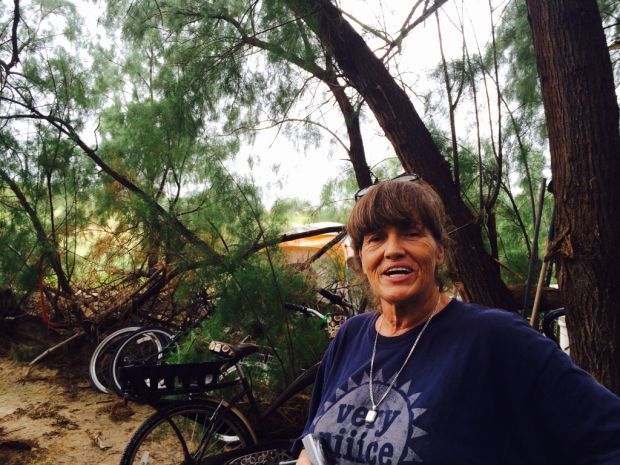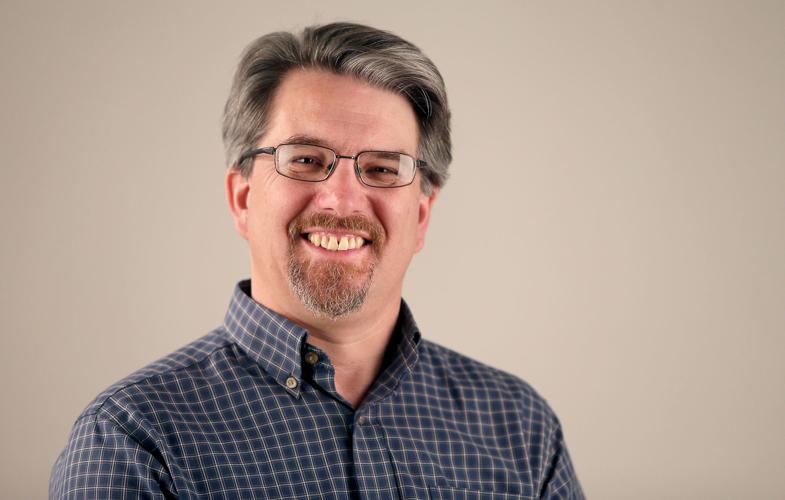Tucson now has a homeless celebrity.
That’s not necessarily a good thing.
I first interviewed Terri Franco and her campmates in February 2014 and detailed how they kept a neat, outdoor home in the Santa Cruz River bottom as “urban campers.” This was in contrast to the Safe Park campers making a mess of Veinte de Agosto Park in downtown Tucson at the time.
Since then, Franco has been interviewed by reporters many times, visited by government officials and now, has had a video done about her life. A documentary maker named Evan Davis beautifully portrayed her life under a tamarisk tree as part of his Just Be You Project.
But the point is, she’s still there, living in slightly improved conditions, and so is her camp-mate Dan McLeod.
The prospect of broad improvement in the life of Tucson’s homeless residents seems as distant as it was when the Safe Park protest camp cropped up in October 2013.
That’s despite the fact that two of the leaders of the Safe Park protest are now $20,000 richer. They sued the city of Tucson over its attempts to prohibit and limit the protest/occupation at the park downtown. Finally, in December, the city settled for $40,000 total, split between plaintiffs Jon McLane and John Cooper.
This is a far cry from what the two promised me when I wrote a critical column on McLane for being way behind on his child-support payments in March 2015. At that time, McLane said:
“We’re in a suit for $5.5 million. That’s what we’re claiming in damages. Once this is all said and done, my children will be more than well taken care of.”
Cooper added then: “That lawsuit’s going to be more than $5 million. That’s going to be more like $20 million!”
Of course, it wasn’t. Instead, everything is pretty much the same. McLane told me Tuesday he plans to start paying child support. His ex-wife, Mayra Espinoza, told me he hasn’t paid her a penny. Same old story.
In a meeting at City Hall Tuesday morning, which I attended with McLane, Michele Ream and other longtimers in Tucson homeless issues, advocates demanded of city officials present that they help with plans to set up small villages of huts, tents or other semi-permanent places where homeless people can live.
The idea is to persuade churches, property owners or other individuals and groups to allow a few of the semi-permanent homes to be set up on the property, as has occurred in Eugene, Oregon, and some other cities.
“I think it’s important for us to push the city for a legal way to do this,” Ream said.
City officials such as Karla Avalos, a member of the mayor’s staff who led a successful initiative against veterans’ homelessness, pointed out that the city worries about the technicalities when someone wants to set up homeless huts or similar camps.
“If an activist group does this, who holds the legal liability? Who is the fiscal agent? Who manages law enforcement and makes sure things run smoothly?” she asked.
Matt Pape, the staffer for council member Richard Fimbres who ably ran the meeting, asked that written proposals for such homeless sites be put together so they are available to present to possible hosts.
After a few of these comments were made, McLane noted: “We’ve learned in the activist community in Tucson it’s better to ask for forgiveness than permission.”
And so, that’s what has been happening. Bit by bit, churches, individual residents and activist groups have been making small efforts at housing homeless people in huts, old RVs or whatever is better than a cot in a shelter or a sleeping bag in a wash.
One homeless person I know has quietly built a hut in a longstanding camp. Some churches are quietly housing a few people. This is the kind of incremental progress that is being made.
And the pace of it drives people like Roy Trout crazy. Trout, who said he has been largely homeless for two decades, boiled over with frustration at the meeting. It’s been especially hard for him since an acquaintance named Michael Hall died a few days ago at the Primavera shelter. Hall had just been approved for housing assistance, but before he could take advantage of it, he collapsed.
“He came up on the housing list,” Trout said at the Primavera shelter. “The next day he came in here looking for help and died.”
Trout said he himself quit drugs four years ago but has been frustrated at every turn in his effort to get permanent housing.
“They keep telling me to jump through rings, and they get smaller and smaller and harder to jump through,” he said. “I’m ready to give up. It seems like I’m just getting false hope. And there’s 100 more like me.”
You want more signs that we’re standing still on this issue? McLane has organized a church and he is planning to re-start operations near Veinte de Agosto Park, perhaps putting cots on the sidewalk for overnighters.
So many meetings have been held, so many plans put together, and such little incremental progress made.
How little? Terri Franco will walk up out of the riverbed and go to the store to buy this paper Wednesday morning. Then she’ll bring it back to her 80-year-old campmate, McLeod. They’ll look at it, surrounded by their dogs, in their home underneath the tree.





